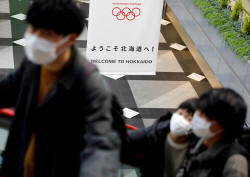Insurers could lose billions if coronavirus prompts
Olympics cancelation
 Send a link to a friend
Send a link to a friend
 [February 28, 2020] By
Noor Zainab Hussain and Carolyn Cohn [February 28, 2020] By
Noor Zainab Hussain and Carolyn Cohn
LONDON (Reuters) - Global insurers face a
hefty bill if the coronavirus forces the cancellation of the Summer
Olympics in Tokyo, with estimates of the cost of insuring the sporting
showpiece running into billions of dollars.
Japan has more than 200 cases of coronavirus, which has infected more
than 80,000 people worldwide and killed around 2,800, mostly in China.
Prime Minister Shinzo Abe's government has ordered numerous sporting
events canceled as it tries to contain the epidemic, but has pledged the
Olympics, in which Japan has invested some $12 billion, will go ahead as
planned from July 24.
But fears persist that the Games may be postponed, moved or even called
off, a decision International Olympic Committee (IOC) member Dick Pound
was reported this week as saying would need to be taken by May.

Potential losses from cancelling an event will generally be higher the
later a decision is made, said Adrian Thomas, a director at insurance
broker Aon <AON.N>.
"If they have to cancel 2-3 weeks before the event start-date, they have
spent everything they have to spend. If you have three months to go
before the event start-date, they have an opportunity to save some event
costs," Thomas said.
IOC President Thomas Bach said on Thursday the Committee is "fully
committed" to the Tokyo Games.
The IOC takes out around $800 million of protection for each Summer
Games, which covers most of the roughly $1 billion investment it makes
in each host city. Insurance sources estimated it would pay a premium of
about 2-3%, giving a bill of up to $24 million to insure the Tokyo
event.
The policy will cover for setbacks ranging from war to natural
disasters.
Easily spread diseases like coronavirus are often excluded from standard
event cancellation insurance, but Alli MacLean of Allianz Global
Corporate & Specialty in London said "the majority of large event
policyholders would purchase communicable disease coverage".
[to top of second column] |

Passengers wearing protective face masks, following an outbreak of
the coronavirus, are seen near a campaign banner for Tokyo 2020
Olympic Games at New Chitose Airport in Chitose, Hokkaido, northern
Japan February 27, 2020. REUTERS/Issei Kato

Allianz <ALVG.DE> has agreed with the IOC to insure the Olympics from 2021 to
2028 but its CEO said last week the German insurance giant had no exposure to
the Tokyo Games.
Local organizers, Olympics sponsors, merchandizers, hoteliers, car hire
companies and travel firms also typically buy insurance, though it may not cover
their full costs.
Munich Re <MUVGn.DE> board member Torsten Jeworrek said on Friday it was a
provider of cancellation insurance for Tokyo, for an amount in the hundreds of
millions of euros.
He would not say whether the figure was more or less than its 250 million euro
exposure to the 2018 Winter Olympics or if the policy covered coronavirus,
citing confidentiality.
Jefferies analysts estimate the insured cost of the 2020 Olympics at $2 billion,
including TV rights and sponsorship, plus $600 million for hospitality.
Insurance sources say policies for most major sporting events are underwritten
by Lloyd's of London or the broader London commercial insurance market.
Lloyd's insurer Beazley <BEZG.L> said in an infographic that event cancellation
insurance for the 2014 and 2018 soccer World Cups covered potential losses of
$1.25-1.5 billion.
Beazley and Tokio Marine Kiln (TMK) are among Lloyd's insurers to have insured
or reinsured the Olympics in the past.

TMK declined to comment. Beazley did not respond to request for comment.
(Additional reporting by Suzanne Barlyn in New York and Alexander Huebner in
Munich; Editing by Catherine Evans)
[© 2020 Thomson Reuters. All rights
reserved.] Copyright 2020 Reuters. All rights reserved. This material may not be published,
broadcast, rewritten or redistributed.
Thompson Reuters is solely responsible for this content. |